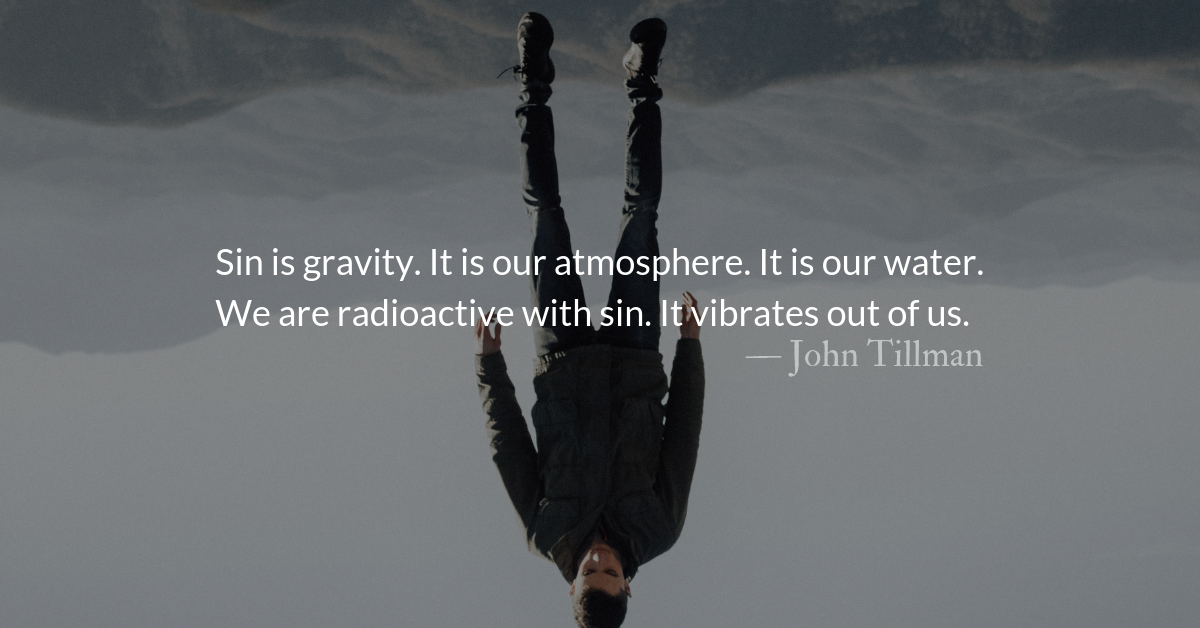Selected by reader, Sam J, from Texas and Elisé, from Ohio
Sam: This was a powerful reminder that it is all too easy to slip into patterns of thought and errors in judgment consistent with the Pharisees. Sin is so much more than actions, it is a condition we are all steeped in.
Elisé: I distinctly remember about seven years ago being convicted that I did not truly understand my sinfulness, and praying to see it so I could appreciate His grace. God taught me the lesson set forth here, that sinfulness is more than just the sum of bad things I do in a day. It permeates my whole life, every action. And when we were yet sinners, Christ died for us!
Scripture Focus: John 9.34
“You were steeped in sin at birth; how dare you lecture us!”
Reflection: Steeped in Sin :: Readers’ Choice
Originally published March 19th, 2019
By John Tillman
The Pharisees are partially correct in the above passage; the formerly blind man was steeped in sin at birth. Where the Pharisees were in error was denying that they were also steeped in sin.
There are two ways of thinking about sin. One sees sins as individual actions. In this calculation, we total sins up, like fines in a legal system. We interpret sins as individual, unconnected actions that are less than perfect good.
This is the mode of sin evaluation favored by the Pharisees and many modern Christians. We prefer to think about sin in this manner because it is measurable and allows us to look at ourselves in comparison to others. No matter how bad we are, we can always find someone who makes us look good by comparison.
This thinking also leads us, like the Pharisees, to see those in difficulty or hardship as suffering from their own sin and wrongdoing. This allows us to further exclude and punish them while absolving ourselves from any responsibility to help them. Today, many view the poor through this lens, seeing generational poverty as the fault of the poor, and the community’s responsibility as minimal or non-existent. This view of the poor can’t be found anywhere in scripture—except perhaps in the views of the Pharisees.
Sin is not just some bad things that we sometimes do. Sinful actions are “sins” but sin is more than actions. It is a condition. It isn’t just a condition that we live with. It’s a condition that we live in. Paul tells us that creation groans to be released from sin, and we feel its effects. Sin is pervasive. It seeps into every crack and corner of our souls.
Sin isn’t like a disease, a condition inside our bodies, as much as it is like an environmental condition, an inescapable influence that surrounds and penetrates us.
Sin is gravity. It is our atmosphere. It is our water. We are radioactive with sin. It vibrates out of us in ways that damage and harm us and anyone we come near.
We need Jesus not to help us make better choices and “sin less.” We need Jesus because only his righteousness is the antidote to the radiation poisoning of rebellion.
We can blind ourselves, like the Pharisees, refusing to see our sin. Or we can admit our former blindness and seeing Jesus, we can say as the formerly blind man did, “Lord, I believe.”
Divine Hours Prayer: The Request for Presence
Help us, O God our Savior, for the glory of your Name; deliver us and forgive us our sins, for your Name’s sake. — Psalm 79.9
– From The Divine Hours: Prayers for Summertime by Phyllis Tickle.
Today’s Readings
1 Samuel 13 (Listen – 3:54)
Romans 11 (Listen – 5:23)
Thank You!
Thank you to our donors who support our readers by making it possible to continue The Park Forum devotionals. This year, The Park Forum audiences opened 200,000 free, and ad-free, devotional content. Follow this link to join our donors with a one-time or a monthly gift.
Submit a Readers’ Choice
Let our community hear how your faith has grown. What post challenged you?
Read more Suffering and Sin
We feel less responsible for problems in the world when we can believe that only the lazy are poor, only the promiscuous are in danger of sexual assault or disease, only hedonists become addicts, and only nihilists suffer depression or have suicidal thoughts.







